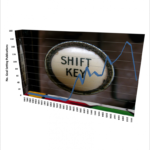Coaching and Leading for the short-term and authenticity
The short term gets a bad press. A short-term measure is frequently seen as superficial, a temporary band aid solution that fails to address the deeper underlying problem. This perspective fails to recognise the fact that the short term regularly turns out to be long term. The things that we do now can and often do have a major influence on things down the track (in the longer term).
You cannot get to the longer term without going through lots of short terms, it simply isn’t possible. However frequently Leaders are criticised for not taking a long-term view, coaches and counselors are enjoined to take a longer term perspective. However anyone demanding a long-term view should be made to spell out how that view articulates in the short term.
I think people are reluctant to spell out the short-term implications of a long-term view, because they feel compelled to produce a “complete” solution. Often an honest and legitimate short term implication is that little will appear to have changed.
Short term is not synonymous with simple. However it is often necessary to simplify in any one short term action, simply because we are human and there are limits to what we can think and do simultaneously. However doing lots of simple things reasonably contemporarily can add up to complexity. Lots of short term actions can address complexity.
The corollary of this is that short-term strategies do not have to be over-simplified and rigid. This is how short-term actions get a bad name. In our preoccupation to be seen to be doing something tangible, we can miscontrue a situation in overly simple terms which in turn begets an overly narrow, simplistic set of actions that may give the appearance of addressing a problem, but in fact is not doing so particularly effectively.
Imagine someone pitching the idea of aging. The long term view is that our hair will go grey or just go and our skin will become wrinkled (Joan Rivers excepted). But what about now? What is the short term effect of aging. The true answer is that tomorrow you’ll pretty much the same as today, notwithstanding any major life events or traumas. And the day after, and the day after that. If you’re lucky and the year after that.
The key to embracing BOTH the short term and the long term is to recognise that in a complex and changing world, it is not always possible to get clear line of sight between the short term and the long term. It may not be clear why events happening now have any meaningful connection with outcomes then. This insight means we cannot control and predict, we cannot know all, we are indeed vulnerable as Brene Brown points out here and in this knowledge we can be authentic leaders, coaches or counsellors.
Being aware and comfortable in discussing that the short term may not offer a complete solution to the puzzle, and indeed that in reality, neither does the longer term, rather what we are trying to do is intentionally and intelligently explore the mystery, is an important step toward authenticity.
Once you have a stated (long term aim, purpose or calling) you can be liberated into attempting lots of short term experiments. The danger lies in attempting to apply planning techniques that work well in a short term situation like goal setting that demands a specific result by a specific time. Imposing such specificity on longer term outcomes has the tendency to stymie short term innovation and experimentation, because it is always being held to account against a rigid set of criteria.
Short term actions may not only fail to appear to be moving things along, it may even appear to be going in the wrong direction. Within the Chaos Theory of Careers, the long term is an emergent pattern (or state) that results from many many repeated short-term events.
Taking action in the short term without a sense of purpose, intention or calling may result in good longer term outcomes, but it relies a lot on chance. Following an intentional, purposeful path may not result in a desired or even desirable outcome (there are no guarantees in life) but it does at least mean you are more likely to be prepared to follow hunches, hear calling, try things out and take action in the first place.
Placing demands on yourself and on others to articulate tangible and specific outcomes in the short-term or the long-term may result in such a jaundiced view of the short term, that you don’t bother even trying. It is a failure to appreciate that trying and striving now can and does lead to places then. The short term is the birthplace of action, but dont waste your time anxiously looking for results. For some things, and dare I say, the most important things, the outcome or result emerges over time, and in some cases, those patterns may not be evident within our lifetimes. That fact should not deter us from trying and trying now.
see also this post on calling and re-souling your career
Related Posts










Pingback: Five ways to resoul your career | The Factory
Jim. I like the idea of highlighting the importance of short term goal setting. Sometimes we can’t even work out the bigger picture – but do need to reach out and take a step (an act of faith). One step leads to another and pretty soon you have a pattern. I think the Solution Focused Theorists have made a good contribution with respect to the importance of short term goal setting. Sometimes one step can reconfigure the meaning of everything else.